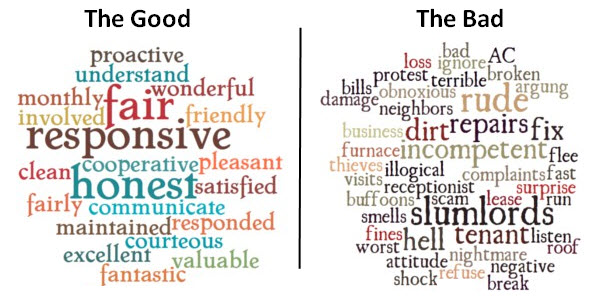
*The above word clouds are comprised of actual words and phrases from the 3,000 reviews we surveyed.
In my last article we covered some of the results from our survey of almost 3,000 reviews of property management companies on Yelp and Yahoo Local (read it first). We found that while there was a mix of tenants, owners, contractors, and realtors leaving reviews, the vast majority of the reviews were left by tenants. This makes sense if for no other reason than the fact that there are far more tenants than any of the other groups.
The fact that the reviews are highly polarized (love or hate) was easy to pick out, but beyond that there were a number of other common themes that came up over and over again. Here were the key issues that for tenants and landlords:
Landlords
Common Complaints
- Delayed reaction time to phone calls and e-mails
- Failure to promptly send out checks
- Excessive and/or unexpected fees (especially maintenance fees)
- Incompetent maintenance staff or contractors (slow, shoddy, overpriced work)
- Took too long to find a tenant
- Placing low quality tenants
Common Praise
- Quick placement of tenant
- Placement of quality tenants
- Made the landlording process easy
- Professional demeanor and rapport
- Knowledgeable staff, understand the law and finer points of dealing with tenants
Tenants
Common Complaints
- Long-standing maintenance requests – Tenant feels ignored or like they’re being passed from person to person in an revolving door of personnel and empty promises and excuses.
- Run down dwelling – Everything from bugs to water spots. The worse the circumstances the more upset they are and the more explosive and colorful the review.
- Rejection of maintenance or upgrade requests
- Hard to get ahold of management. Took multiple phone calls and emails.
- Failure to return all or a portion of the security deposit.
- Rent increases – too often or a sharp jump.
- Unfair enforcement of lease violations, fees and evictions.
- Poor interpersonal skills – Property manager was rude, condescending etc.
- Bait & switch – Showing a unit different than the actual unit issued, making false or misleading promises or move-in incentives, etc.
Common Praise
- Friendly caring staff
- Property manager was understanding and genuinely wanted to help tenant
- Quick response to maintenance requests
It likely comes as no surprise to property managers that the list of complaints is longer than praises from tenants. The reasons for this are important as tenant reviews shape the overall atmosphere for online reviews of management companies. I’ll be covering this soon in a post titled “Why people love to hate their property management company”.
Want to beat me to the punch and provide your own explanation of what influences the online reviews we see in this industry? Let me know in the comments.
{ Comments on this entry are closed }
